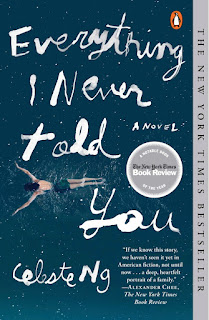Everything I Never Told You
Celeste Ng
Adult
Going back through the books I read this summer to choose one to review was a fun romp through my adventures over the last three months. I was torn as to what to highlight - lighthearted but meaningful (the series Breakfast with...Lunch with...and then Dinner with Buddha) or deeply deeply meaningful (Everything I Never Told You). I went for the latter because this piece not only walks the line between meat and potatoes and dessert (i.e. literary and fun reading) but also does things from a craft perspective that are really worth talking about and gets at issues currently in the collective conscious.
Basic premise: Teenage Lydia is missing. Later, she's found dead in the local lake. Was it suicide, or was it murder? The family unravels with Lydia's death, and in unraveling, reveals their own hopes and unfulfilled dreams, fears, heartaches, and regrets.
The great Tim Wynn-Jones once said that the focus of YA is learning to get a grip, whereas with adult lit, it's learning to let go. And there was talk amongst my author friends whether this is YA or Adult. I personally listed it as YA because teenage death is so very pertinent to the YA audience, but because Ng dips into the POV of every character from 8 year old sister to 45 year old father, I'm happy to list it as adult here. I have a feeling, much like, The Curious Incident of the Dog in the Nighttime, this will cross from initially adult literature to a younger audience. It's both that pertinent and that accessible, not to mention well written.
By telling the story from omniscient 3rd - first & second talking points - Ng enables us to see the effect Lydia's death has on each member of her family. Since the family is also Asian American in the 1970s, a time when multicultural families were rare, we get a glimpse into the effects of discrimination on all age groups, third talking point. Finally, the mom's, Marilyn, POV brings up a discussion that's been on my radar lately with teenage girls about to leave the house - can you really, as a woman, have it all? Fourth talking point.
Let's take omniscient 3rd, the much loved and hated POV. Arguably, it is the most fitting, especially given the title. We learn everything everyone didn't tell and might never share. Further, Ng sets it up so that only because of omniscient third can we, the reader, and only we, solve the mystery as to what really happened to Lydia (don't worry, no spoilers). That's making POV work for you.
The We Need Diverse Books campaign has a winner here. We get a glimpse into multicultural Asian families of the 1970s, and, with Ng's reader's guide, also of her childhood. Anyone who has lived in a foreign culture, understands what it means to stand out as different. This, of course, goes much further, because the Lee's are American, thus, not foreign to their setting or culture, and yet, because of prejudice, are treated as such. Add to that, that Lydia, because she could pass for white, suffers acutely and differently from every other member of her family.
I've already touched upon accessibility and pertinence to a widely diverse audience according to age, thanks to the multiple perspectives we get to experience, and that gets at the mother's POV. Marilyn is more than qualified and smart enough to be the doctor she wants to be, but she finds herself trapped in the role of stay-at-home mother once she gets pregnant and then married. To her, it's suffocating, only partially fulfilling, and ultimately drives her to put the crushing weight of all of her hopes and dreams on her daughter, Lydia's, shoulders.
Now here's the thing, women of the 1970s were breaking ground for my generation. When I got to college in the late 80s, classes were pretty evenly male/female. And yet, today, women still do not fill an equitable number of positions of leadership in business or government. Further, the pressing question for the generation of women just entering the workplace and about to enter college is: can I really have it all? Anne-Marie Slaughter, professor at Princeton, mother of 2, and someone I read extensively while working on my PhD because she's in my field, herself eventually left her position in the Obama administration for her family. She addresses the issue of work and family in a 2012 article - "Why Women Can't Have it All", in The Atlantic. This is great food for conversation and thought and really has me thinking about our perspectives as a society.
So, if you want a thriller that also leaves you hunched over like The Thinker deliberating all sorts of bigger issues, look no further. Everything I Never Told You is that book. And for other great Fall treats, skip over to Barrie Summy's site. She's dishing them out cool and crunchy.
Shade gardens and reading
1 week ago



